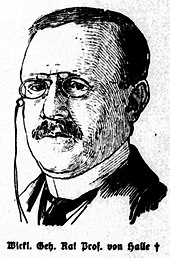Ernst Levy von Halle
Ernst von Halle (born January 17, 1868 in Hamburg as Ernst Levy ; † June 28, 1909 in Grunewald ) was a German economist and university professor who was temporarily active in the Reichsmarineamt.
Life
Ernst Levy was a son of the Jewish lawyer Hermann Levy, who was a member of the Hamburg citizenship . In 1895 he dropped the clearly Jewish family name “Levy” and instead took the maiden name of his mother “von Halle”, who came from another Jewish family in Hamburg. He converted to Christianity and became a Protestant . He attended the learned school of the Johanneum and studied at the universities of Munich, Bonn and Leipzig as well as at the Berlin Friedrich-Wilhelms-Universität , where in 1889 he became a member of the Corps Vandalia Berlin .
In 1897 he came to the Reichsmarineamt and became press spokesman ("Propaganda chief") of Admiral Alfred von Tirpitz , who considered him "the crown of the fleet-friendly Jews".
In 1903 Ernst von Halle married Henriette von Moßner, a daughter of General Walther von Moßner . They had two sons and a daughter. His son Ernst (* 1905) drove automobile races and had a fatal accident at the 1928 German Grand Prix on the Nürburgring .
Von Halle was appointed secret admiralty council in 1906. He was associate professor of economics at the Friedrich-Wilhelms-Universität Berlin and honorary professor at the Technical University of Charlottenburg . In 1908/1909 he went on a study trip to the United States .
Halles' declared aim was to consolidate Germany and create the domestic political basis for a role as a world power . With Max Weber he represented the connection between world power politics and social reform in the interests of national integration.
Fonts
- The free trade broker in Hamburg and his position. In: Yearbook for Legislation, Administration and Economics , Volume 16 (1892), pp. 1109–1176.
- The free trade broker in Bremen. In: Yearbook for Legislation, Administration and Economics , Volume 17 (1893), pp. 427-450.
- Industrial business and business associations in the United States of North America. In: About economic cartels in Germany and abroad. Fifteen descriptions along with a number of articles of association and enclosures. (= Writings of the Association for Social Policy , Volume 60.) Duncker & Humblot, Leipzig 1894, pp. 93–326.
- Trusts, or Industrial Combinations and Coalitions in the United States. Macmillan, New York 1895.
- Cotton production and plantation in the North American southern states. Duncker & Humblot, Leipzig 1897. (as reprint: Schmidt, Bad Feilnbach o. J.)
- Germany's maritime interests. In: Volks- und Seewirtschaft. Speeches and essays. Mittler, Berlin 1902 (1897), pp. 136-171.
- World power politics and social reform. In: Volks- und Seewirtschaft. Mittler, Berlin 1902 (1899), pp. 203-241.
- (o. V., edited by the Reichsmarineamt): The development of German maritime interests in the last decade. Mittler, Berlin 1905.
- America. Hamburg 1905.
- The sea power in German history. Leipzig 1907.
- The preliminary training for the profession of economic specialist. Berlin 1907.
- Economics in today's civil servant education. Berlin 1909.
In addition, from 1899 Ernst von Halle was editor of the publication Nauticus , the yearbook for Germany's sea interests .
literature
- Werner E. Mosse (and Arnold Paucker ): Jews in Wilhelmine Germany 1890–1914. 2nd edition, Tübingen 1998. ( limited preview of Google books )
- Guenther Roth : The political context of Max Weber's contribution on the German economy in the Encyclopedia Americana. In: Zeitschrift für Soziologie , ISSN 0340-1804 , Volume 36, Issue 1 (February 2007), pp. 65–77. ( Digitized version )
Web links
- Literature by and about Ernst Levy von Halle in the catalog of the German National Library
- limited preview of the yearbook for German marine interests 1900
Individual evidence
- ^ A b c G. Roth: The political context of Max Weber's contribution on the German economy in the Encyclopedia Americana. P. 66 ff.
- ↑ Kösener corps lists 1910, 17/241.
- ↑ Ernst Kehr: Battle Fleet Construction and Party Politics 1894–1901: Attempt to cross-section the domestic, social and ideological preconditions of German imperialism . Berlin 1930, p. 185 .
- ↑ Ernst von Halle. www.motorsportmemorial.org, accessed on March 22, 2020 (English).
| personal data | |
|---|---|
| SURNAME | Halle, Ernst Levy from |
| ALTERNATIVE NAMES | Levy, Ernst (until 1895) |
| BRIEF DESCRIPTION | German economist and university professor |
| DATE OF BIRTH | January 17, 1868 |
| PLACE OF BIRTH | Hamburg |
| DATE OF DEATH | June 28, 1909 |
| Place of death | Grunewald |
